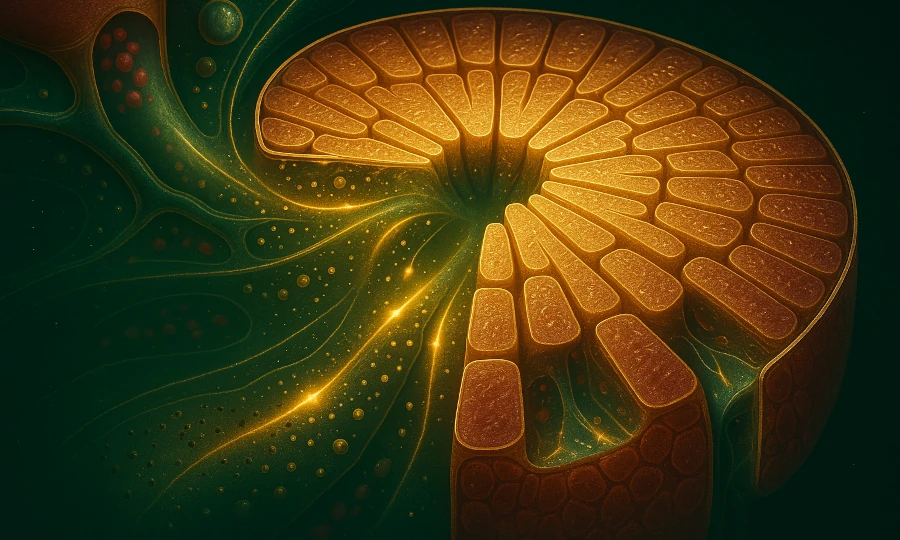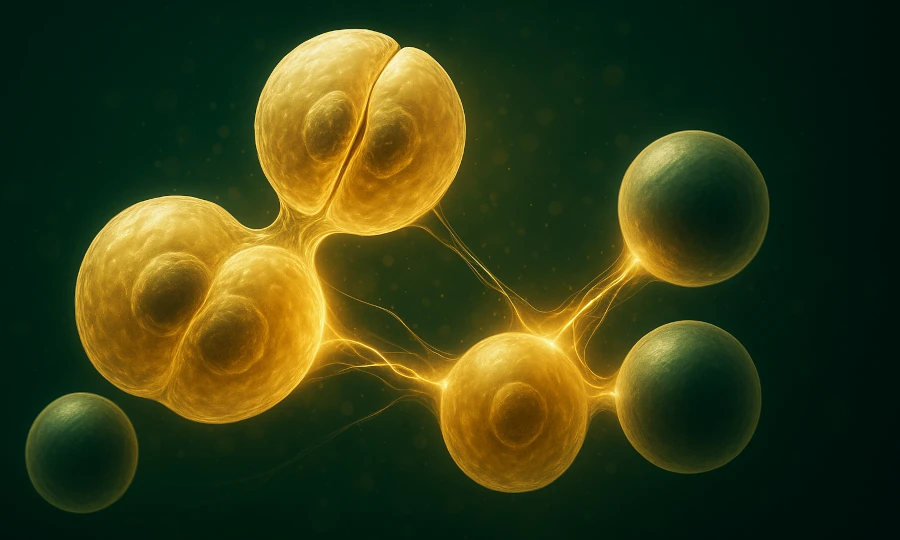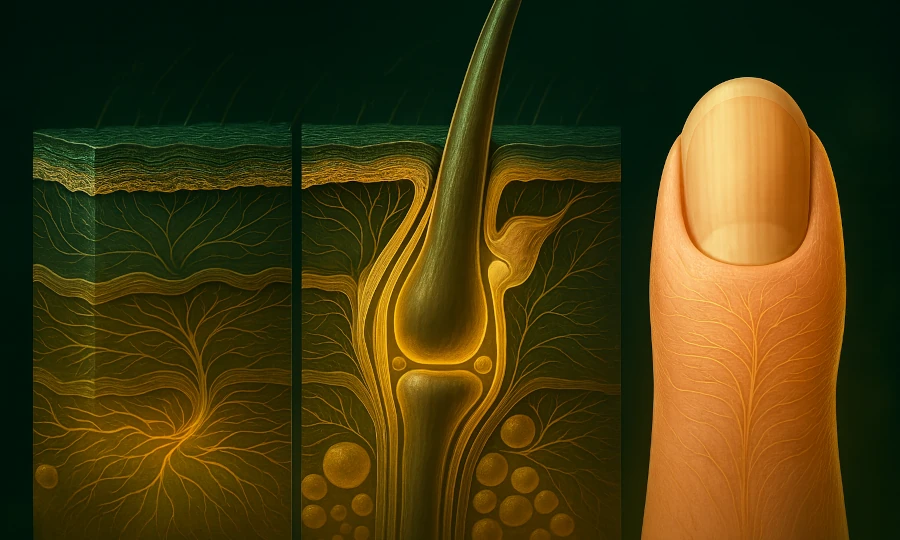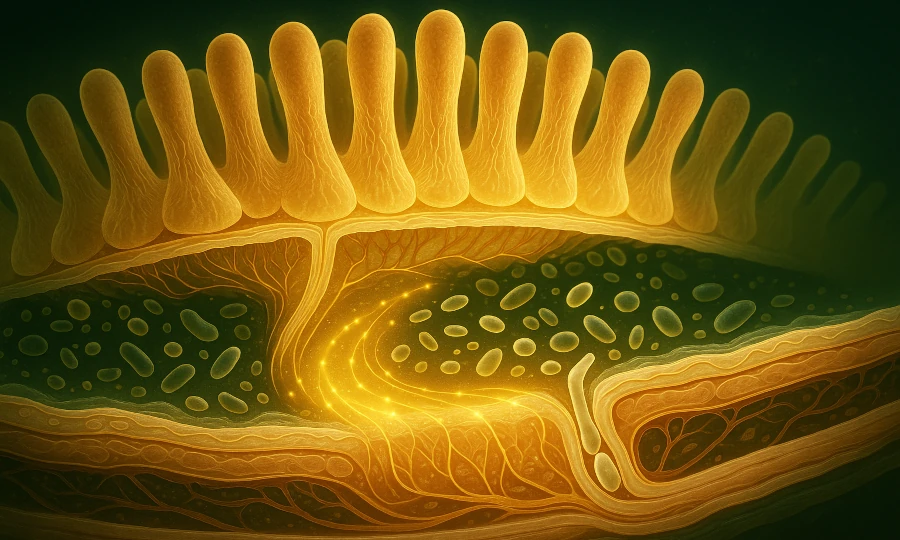
The liver represents a fascinating biochemical factory of our body and is a key organ for maintaining overall health and vitality. As the main detoxification center of the organism, the liver processes thousands of chemicals daily, transforms them into harmless compounds, and ensures their safe elimination from the body. In today's world, however, the liver is exposed to unprecedented stress – from industrially processed foods and environmental toxins to medications, alcohol, and chronic stress.
Comprehensive Support for Healthy Liver and Natural Detoxification
Roanga Infinity® contains carefully selected plant extracts and bioactive substances that support the body's natural cleansing processes and contribute to normal liver function. The combination of traditional herbs, antioxidants, and marine components creates harmonious support for the body's balance.
Modern scientific research suggests that optimal liver function and effective detoxification depend on the interplay of several key factors:
- Healthy structure and function of liver cells (hepatocytes)
- Optimal progress of detoxification phases (phases I and II)
- Effective excretion of toxins via bile and their elimination through the intestines
- Protection of liver cells from oxidative stress
- Natural regenerative capacity of liver tissue
Supporting Liver Health
Healthy structure and function of liver cells is the foundation for optimal detoxification processes and metabolism. Liver cells are equipped with sophisticated enzymatic systems that transform potentially harmful substances into forms that can be safely eliminated from the body.
Milk thistle (silymarin) and garlic contribute to normal liver function and its ability to participate in the detoxification of the organism. Scientific studies document that silymarin, the main active component of milk thistle, can support the regeneration of liver cells and contribute to their protection against various toxins (Abenavoli et al., 2018, International Journal of Molecular Sciences).
These traditional herbs can help:
- Support healthy structure and function of liver cells
- Contribute to natural regeneration of liver tissue
- Support optimal activity of liver enzymes
- Contribute to efficient progress of detoxification processes
Traditional Herbal Cleansing
Effective detoxification requires not only optimal liver function but also a healthy digestive system that ensures the elimination of toxins from the body. Traditional herbs have served as natural support for these processes for centuries.
Wormwood, clove, and black walnut are traditionally used to support the digestive system and natural cleansing processes. A systematic review published in the Journal of Traditional and Complementary Medicine (2020) documents that these traditional herbs can support healthy intestinal microflora and contribute to optimal elimination of toxins from the body (Liu et al., 2020).
These natural herbs can help:
- Support healthy intestinal microflora, which is important for detoxification
- Contribute to optimal function of the gallbladder and bile excretion
- Support regular intestinal peristalsis and elimination of toxins
- Contribute to maintaining a healthy environment in the intestines
"The liver is a masterpiece of nature – a silent guardian of our health that tirelessly works to maintain internal balance. Natural bioactive substances can support this vital organ and contribute to its optimal function in the challenging conditions of the modern world."
Antioxidant Cell Protection
Detoxification processes in the liver can paradoxically create reactive intermediates and free radicals that can damage liver cells. Antioxidant protection is therefore key to maintaining healthy liver function.
Lycopene, OPC from grape seeds, and fucoidan help tissue
Adaptogens for Balance
The ability of the organism to adapt to various forms of stress and strain has a significant impact on liver function and the effectiveness of detoxification processes. Chronic stress can disrupt liver functions and contribute to metabolic imbalance.
Reishi and ginseng support the overall resilience of the organism and contribute to better adaptation to stress, which also benefits natural cleansing functions. A study published in the Journal of Ginseng Research (2017) suggests that adaptogenic properties of these traditional mushrooms and herbs can support a healthy response to stress and contribute to protecting liver functions (Kim et al., 2017).
These traditional adaptogens can help:
- Support the natural resilience of the organism to stress, which can affect liver function
- Contribute to optimal energy balance of liver cells
- Support healthy immune response in liver tissue
- Contribute to overall neuro-endocrine balance of the organism
Holistic Approach to Supporting Liver and Detoxification
Liver health and effective detoxification are the result of a complex interplay of many bodily systems and processes. Modern scientific findings confirm that optimal support requires a holistic approach that focuses on key aspects of liver health – from protection and regeneration of liver cells through support of detoxification enzymes to optimization of toxin elimination from the body.
Roanga Infinity® offers comprehensive natural support that combines traditional wisdom with modern scientific knowledge. Carefully selected natural substances work in synergy and can contribute to the natural balance and vitality of the liver, which is reflected in overall health and energy of the organism.
Note: Roanga Planet products are dietary supplements that can contribute to supporting natural processes in the body. They are not intended to diagnose, treat, cure, or prevent any disease.
Frequently Asked Questions about Liver and Detoxification
How does detoxification in the liver work?
Detoxification in the liver is a sophisticated process that typically takes place in two main phases. In Phase I (transformation phase), toxins are modified through various reactions such as oxidation, reduction, or hydrolysis. These reactions are catalyzed by cytochrome P450 (CYP) enzymes, and their goal is to transform lipophilic (fat-soluble) toxins into more polar compounds. Paradoxically, Phase I intermediates can be more reactive and potentially more harmful than the original toxins. In Phase II (conjugation phase), these intermediates are combined with various endogenous molecules such as glutathione, glucuronic acid, sulfates, or amino acids. These conjugation reactions are catalyzed by enzymes such as glutathione-S-transferases (GST), UDP-glucuronosyltransferases (UGT), and sulfotransferases (SULT). The result is the creation of water-soluble compounds that can be excreted from the body via bile or urine. Sometimes a Phase III is also mentioned, which involves the transport of detoxified compounds from liver cells through specialized transport proteins. Effective detoxification requires optimal function of all these phases and balance between them. Imbalance can lead to accumulation of toxic intermediates and oxidative stress. Natural substances such as antioxidants, flavonoids, and sulfur compounds can support various aspects of detoxification processes and contribute to their optimal function.
What is non-alcoholic fatty liver disease and how prevalent is it?
Non-alcoholic fatty liver disease (NAFLD) is a condition where excess fat accumulates in liver cells in individuals who do not drink alcohol in amounts that could cause liver damage. NAFLD is the most common chronic liver disease in developed countries, and its prevalence is dramatically increasing. It is estimated to affect 25-30% of the adult population in the Western world and up to 80-90% of individuals with obesity or type 2 diabetes. NAFLD exists in several forms, from simple steatosis (fat accumulation) through non-alcoholic steatohepatitis (NASH - steatosis with inflammation and cell damage) to liver fibrosis and cirrhosis. While simple steatosis is relatively benign, NASH can progress to more severe forms of liver damage. The main risk factors for NAFLD are obesity, insulin resistance, type 2 diabetes, high triglyceride levels, and metabolic syndrome. Genetic factors also play a role in susceptibility to this disease. NAFLD is often referred to as a "silent epidemic" because most patients have no symptoms until significant liver damage occurs. A healthy lifestyle, including a balanced diet, regular physical activity, and maintaining optimal body weight, is the foundation of NAFLD prevention and management. Natural substances with hepatoprotective and anti-inflammatory effects, such as silymarin from milk thistle, can be part of a comprehensive approach to supporting liver health.
How does diet affect liver health and detoxification processes?
Diet has a fundamental impact on liver health and the effectiveness of detoxification processes. The liver is a metabolically very active organ that processes nutrients from food while also detoxifying harmful substances. Some foods can support liver health and detoxification, while others can burden the liver. Foods rich in antioxidants, such as colorful fruits and vegetables, can protect liver cells from oxidative stress that arises during detoxification processes. Cruciferous vegetables (broccoli, kale, cauliflower) contain compounds that can stimulate Phase II detoxification enzymes. Foods rich in sulfur, such as garlic, onions, and eggs, provide precursors for glutathione synthesis, a key antioxidant and conjugating agent in detoxification. Healthy fats, especially omega-3 fatty acids, can support healthy structure of cell membranes and anti-inflammatory processes in the liver. Fiber is important for binding toxins in the intestines and their elimination, which prevents their reabsorption. Conversely, excessive consumption of processed foods, trans fats, refined sugars, and alcohol can contribute to oxidative stress, inflammation, and fat accumulation in the liver. Moderate protein intake is important for detoxification, but excessive intake can burden the liver. Hydration is also key because water is essential for dissolving and excreting toxins. Overall, the Mediterranean diet, which is rich in fruits, vegetables, whole grains, fish, olive oil, and nuts, is often recommended for supporting liver health.
How can milk thistle support liver health?
Milk thistle (Silybum marianum) is a medicinal herb with a long history of use in traditional medicine for supporting liver health. The main active component of milk thistle is silymarin, a complex of flavonolignans that includes silybin, silydianin, and silychristin. Scientific studies suggest that silymarin can support liver health through several mechanisms. First, it has significant antioxidant effects that can protect liver cells from damage by free radicals produced during detoxification processes. Second, silymarin can stabilize cell membranes of liver cells, which increases their resistance to toxic substances. Third, it can stimulate protein synthesis in the liver, which supports regeneration of liver tissue and formation of new liver cells. Fourth, silymarin exhibits anti-inflammatory effects that can alleviate inflammatory processes in the liver. Fifth, it can modulate the immune response and reduce production of pro-inflammatory cytokines. Sixth, silymarin can inhibit activation of stellate cells, which are cells responsible for scar tissue formation (fibrosis) in the liver. Clinical studies have examined the potential benefits of milk thistle in various liver problems, including viral hepatitis, alcoholic liver damage, non-alcoholic fatty liver disease, and toxic liver damage. Although more extensive clinical studies are needed, current research suggests that milk thistle can be a valuable component of a comprehensive approach to supporting liver health.
What is the relationship between liver health and overall health of the organism?
Liver health and overall health of the organism are closely interconnected because the liver performs many vital functions. As the main detoxification organ, the liver removes harmful substances from the blood, thereby protecting other organs and tissues from their toxic effects. The liver plays a key role in nutrient metabolism – it processes and stores carbohydrates, metabolizes fats and cholesterol, and synthesizes and breaks down proteins. It produces bile, which is essential for digestion and absorption of fats and fat-soluble vitamins (A, D, E, K). The liver synthesizes many important proteins, including albumin (the main protein in blood plasma) and coagulation factors (important for blood clotting). It regulates hormone levels, including insulin, growth hormone, glucagon, and sex hormones. It stores important vitamins (A, D, E, K, B12) and minerals (iron and copper). Given these diverse functions, liver dysfunction can affect almost all aspects of health. Chronic liver diseases can lead to fatigue, reduced immunity, hormonal imbalance, metabolic disorders, digestive problems, and many other health issues. Conversely, many systemic diseases can impact the liver. For example, diabetes, obesity, and metabolic syndrome are associated with a higher risk of non-alcoholic fatty liver disease. Autoimmune diseases can affect the liver and lead to autoimmune hepatitis or primary biliary cholangitis. Supporting liver health through a healthy lifestyle and potentially natural substances with hepatoprotective effects can contribute to overall health and vitality of the organism.
Sources and References
- Anton Gillessen, Hartmut H-J Schmidt, et al. (2020). Silymarin as Supportive Treatment in Liver Diseases: A Narrative Review. (pmc.ncbi.nlm.nih.gov/articles/PMC7140758/)
- Saleh A. Almatroodi, Shehwaz Anwar, Ahmad Almatroudi, et al. (2020). Hepatoprotective Effects of Garlic Extract against Carbon Tetrachloride (CCl4)-Induced Liver Injury via Modulation of Antioxidant, Anti-Inflammatory Activities and Hepatocyte Architecture. (www.mdpi.com/2076-3417/10/18/6200)
- Kim, H.G., et al. (2017). Hepatoprotective effect of ginseng in alcohol-induced liver injury: A systematic review and meta-analysis. Journal of Ginseng Research, 41(4), 503-511. (doi.org/10.1016/j.jgr.2017.01.002)


